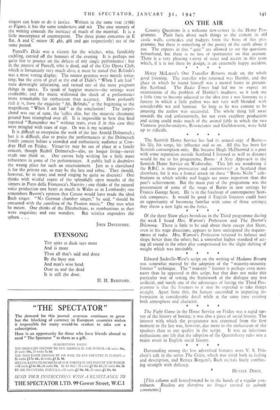ON THE AIR
Country Questions is a welcome new-comer in the Home Pro- gramme. Plain facts about such things as the cement in old castle walls, corncakes and badgers form the basis of this pro- gramme, but there is something of the poetry of the earth about it too. The experts in this " quiz " are allowed to see the questions beforehand, but there is no loss of spontaneity on that account. There is a very pleasing variety of voice and accent in this team which, if it is not there by design, is an extremely happy accident.
Moray McLaren's One Traveller Returns made on the whole good listening. The traveller who returned was Hamlet, and the place in which he found himself was a mental home in present- day Scotland. The Radio Times had led me to expect an examination of the problem of Hamlet's madness, so it took me
a little time to become adjusted to the idea that I was listening to a fantasy in which a little pathos was not very well blended with
considerable wit and humour. So long as he was content to be amusing the author was successful. The whole thing fell away towards the end unfortunately, for not even excellent production and acting could make much of the animal fable in which the two Viennese psycho-analysts, Rosencrantz and Guildenstern, were held up to ridicule. * * * *
The Scottish Home Service has had its annual orgy of Burns— his life, his songs, his influence and so on. All this has been for Scottish consumption only. Bbt because Hugh McDiarmid is a poet with some reputation outside Scotland I listened as well as distance would let me to his programme, Burns A New Approach in the Scottish Home Service on Wednesday. This left me wondering if the B.B.C. is more provocative and controversial .n Scotland than elsewhere, for it was a frontal attack on those " Burns Nicht " cele- brations in which whisky and haggis are more important than the poet's achievement. But the main part of the programme was the presentation of some of the songs of Burns in new settings by Francis George Scott. He is in the forefront of contemporary Scot- tish composers. It would be good if English listeners could have an opportunity of becoming familiar with some of those settings;
they throw a new light on the lyrics. * *
Of the three Shaw plays broadcast in the Third programme during the week I heard Mrs. Warren's Profession and The Doctor's Dilemma. There is little to be said about them except that Shaw,
even in his stage directions, appears to have anticipated the require- rrlents of radio. Mrs. Warren's Profession retained its balance and shape better than the other; bu: a somewhat higher standard of act- ing all round in the other play compensated for the slight shifting of weight which was inevitable. * * * * Edward Sackville-West's script on the writing of Madame Bovary was somewhat marred by the adoption of the " majority-minority listener " technique. The " majority " listener is perhaps even more naive than he appeared in this script, but that does not make this particular way of setting the framework of the dialogue any less artificial, and surely one of the advantages of hay* the Third Pro- gramme is that the listeners to it may be expected to take things straight. Apart from this, the feature succeeded in imparting in- formation in considerable detail while at the same time creating both atmosphere and character. * * * The Fight Game in the Home Service on Friday was a rapid sur- vey of the history of boxing; it was also a piece of social history. The interest with which the programme was crammed from the first moment to die last was, however, due more to the enthusiasm of the
speakers than to any quality in the script. It was an infectious enthusiasm; one felt that the adoption of the Queensberry rules was a major event in English social history.
Outstanding among the less advertised features were V. S. Prit- chett's talk in the series The Crisis, which was vivid both in feeling and description, and Renata Borgatti's Bach recitals finely combin- ing strength with delicacy.
• HUNTER D1ACK.
[This column will henceforward be in the hands of a regular con- tributor. Readers are therefore no longer invited to submit comments.]


































 Previous page
Previous page